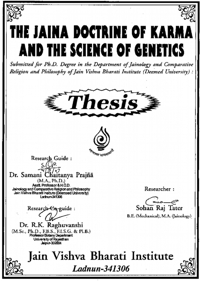Anuvrats[19]
It is difficult for house holders to fully practice the above vows, and so, the vows that house holders take have some limitations and are called minor vows. These vows are not as stringent as Mahavrats and people who take these vows are called Sṛāvakas, Srāvikas or Āgāri.
(i) Sthūla Paṇivāyāo Virmaṇa Vrata (limited Non-violence vow)
Being a house holder, one has to carry out house hold and community activities. Thus, it is not possible to totally avoid violence, especially against one sensed living beings. However, one should take the utmost care to observe non-violence.
(ii) Sthūla Musāvāyāo Virmaṇa Vrata (limited Truthfulness vow)
One should take the utmost care in not telling lies. Another words one should only speak the truth.
(iii) Sthūla Ādinnādānāo Virmaṇa Vrata (limited Non-stealing vow)
One should take the utmost care not to steal or borrow the belonging of others without their permission.
(iv) Sthūla Mehuṇāo Virmaṇa Vrata (limited Celibacy vow)
One should be satisfied with his spouse only and should avoid sexual contact with others.
(v) Sthūla Pariggahāo Virmaṇa Vrata (limited Non-possessiveness vow)
One's earning for material possessions and greed for collection should be as limited as possible.
Guṇavratas (supporting vows)[20]
The following vows support the above five vows so that they can be carried out more effectively.
(vi) Diśā Parimaṇa Vrata (Geographic limitation vow)
Since it is necessary to move to fulfill one's needs, one should limit his desire to perform activities with in a needed radius of area. Therefore, one should set limits with in the scope of travel or business etc.[21]
(vii) Bhogopabhoga Virmaṇa Vrata (consumption and occupation limited vow)
One should set limits on the consumption of various items despite whether they are used once or repeatedly to avoid incoming sins. Also one should limit oneself to the kind of occupation he selects because some occupations have more exposure to sins than others.
(viii) Anarthadaṅdavirati Vrata (purposeless Violence limitation law)
We sometimes carry out activities for fun or to tease our friends and foes. However, we should realize that all such activities attract karmas. This vow reminds us not to build unnecessary karmas.
The above eight vows tell us how we can limit our actions (mental, verbal and physical activities) in order to reduce the inflow of karmas. The next four vows train us to stop karma from coming in, and to get rid of existing karmas.
(ix) Sāmāyika Vrata (self control and equanimity vow)
Since we live a social life, it may not be possible to spend much time in shedding karmas, but we should spend at least fourty-eight minutes a day in such efforts. During these fourty-eight minutes, we give up all familial, social, economical and cultural responsibilities and we control ourselves mentally, verbally, and physically. During this time we should concentrate on religious readings or meditation, which will help in preventing new karma come in as well as help to get rid of old karma. This 48 minutes will also give us a glimpse as to how easy or difficult it may be to control overselves. Once we become accustomed to doing this. We may extend the self-control time to a period of more than 48 minutes.
(x) Deśāvakāśika Vrata (day to day additional limitation vow)
At the time of waking up, we take this vow in order to put limits on our activities for that day, and thus, limit our exposure to accumulating karma. In this way we learn to live a more controlled life.
(xi) Poṣadha Vrata (Monkshood exposure vow)
This vow teaches us how to live like a monk, or a nun, for a day. By taking this vow, we give up all our household, social, economical and cultural responsibilities for a day. We should practice this vow as often as possible. By practicing this vow, the inflow of new karma is slowed down and existing karmas are eradicated. If this vow is easy to observe it may eventually lead to monkshood.
(xii) Atithi Saṁvibhāga Vrata (selfless offerings to unexpected guests vow)
This vow teaches us to share. Sharing is more worth while when an unexpected, needy person comes to your door and you offer with an open heart. Monks and nuns are the best receptors for this type of sharing. However, while giving you should not have any regret or expectations in your mind. By sharing, you are developing a sense of detachment with the feeling that nothing is mine. Observing this vow will lead to liberation from worldly life.[23]
Our thoughts while talking these vows are also very important. They should be positive and meant to destroy karmas.
There are three common obstacles to our vows:
(i) Māyā (Deception)
(ii) Nidāṇa (Expectations)
(iii) Mithyātva (Wrong beliefs)(i) Māyā (Deception)
When you take a vow, it should be for the betterment of your soul. Vows should not be taken to show-off or receive praise. Also those should not be taken to deceive otherwise these will produce inferior results.
(ii) Nidāna (Expectations)
Many of us take vows in order to gain something materialistic in return. Such is not good because not only do we use up what we achieve, but we lose the main purpose of performing vows to destroy karmas.
(iii) Mithyātva (Wrong beliefs)
This occurs when one, without belief in liberation, takes the vow that the ultimate pleasure of the body is the prime purpose in this life. We should not forget that austerities are performed to liberate the wandering soul from worldly engrossment. We must understand the values of vows mentally, verbally as well as physically otherwise these will not bear the proper results.
 Prof. Dr. Sohan Raj Tater
Prof. Dr. Sohan Raj Tater
 Doctoral Thesis, JVBU
Doctoral Thesis, JVBU